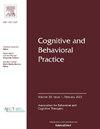将书面暴露疗法和辩证行为疗法技能培训作为一种新型综合干预措施,用于治疗同时患有创伤后应激障碍和进食障碍的女性:两个案例研究
IF 2.9
3区 心理学
Q1 PSYCHOLOGY, CLINICAL
引用次数: 0
摘要
大约四分之一的创伤后应激障碍(PTSD)患者同时患有饮食失调(ED)。然而,目前关于同时治疗PTSD和ed (PTSD- ed)的研究非常有限。两个案例研究说明了使用书面暴露疗法(WET)治疗PTSD与辩证行为疗法(DBT)治疗饮食失调的针对性技巧(即辩证戒断、自我抚慰、赞成/反对、正念冲动冲浪、提前应对)相结合的方法治疗两名女性PTSD。数据包括治疗前、治疗后以及6至8周的PTSD和ED症状随访评分。客户1完成了5次治疗。在入院时,根据临床访谈和自我报告收集的信息,她符合创伤后应激障碍和其他特定进食障碍的标准。她报告在治疗后和6至8周的随访中,PTSD和ED症状均有所减轻。2号病人完成了7次治疗。在入院时,根据临床访谈和自我报告收集的信息,她符合创伤后应激障碍和暴食症(BED)的标准。在最后一次治疗和6至8周的随访中,她报告了PTSD和BED症状的减轻。案例研究的结果表明,创伤后应激障碍的WET结合ED的DBT技能,对于减少并发的PTSD和ED症状有很大的希望。未来的研究应该正式评估综合WET和DBT技能治疗ptsd的可行性、可接受性和有效性。本文章由计算机程序翻译,如有差异,请以英文原文为准。
Written Exposure Therapy and Dialectical Behavior Therapy Skills Training as a Novel Integrated Intervention for Women With Co-Occurring PTSD and Eating Disorders: Two Case Studies
Approximately one quarter of people with posttraumatic stress disorder (PTSD) also have an eating disorder (ED). Yet, there is very limited research on interventions addressing PTSD and EDs (PTSD-ED) simultaneously. Two case studies illustrate the treatment of two women with PTSD-ED using Written Exposure Therapy (WET) for PTSD combined with targeted skills from Dialectical Behavior Therapy (DBT) for Eating Disorders (i.e., dialectical abstinence, self-soothing, pro/cons, mindful urge-surfing, coping ahead). Data include pre-, posttreatment, and 6- to 8-week follow-up scores of PTSD and ED symptoms. Client One completed five sessions. At intake, she met criteria for PTSD and Other Specified Feeding and Eating Disorder based on information gathered in a clinical interview and self-report measures. She reported reductions in both PTSD and ED symptoms at posttreatment and at a 6- to 8-week follow-up. Client Two completed seven sessions. At intake, she met criteria for PTSD and Binge Eating Disorder (BED) based on information gathered in a clinical interview and self-report measures. She reported reductions in symptoms of PTSD and BED at her final session and at a 6- to 8-week follow-up. Results from the presented case studies suggest WET for PTSD combined with DBT skills for EDs holds strong promise for reducing co-occurring PTSD and ED symptoms. Future studies should formally assess the feasibility, acceptability, and effectiveness of integrated WET and DBT skills for the treatment of PTSD-ED.
求助全文
通过发布文献求助,成功后即可免费获取论文全文。
去求助
来源期刊

Cognitive and Behavioral Practice
PSYCHOLOGY, CLINICAL-
CiteScore
4.80
自引率
3.40%
发文量
118
审稿时长
84 days
期刊介绍:
Cognitive and Behavioral Practice is a quarterly international journal that serves an enduring resource for empirically informed methods of clinical practice. Its mission is to bridge the gap between published research and the actual clinical practice of cognitive behavior therapy. Cognitive and Behavioral Practice publishes clinically rich accounts of innovative assessment and diagnostic and therapeutic procedures that are clearly grounded in empirical research. A focus on application and implementation of procedures is maintained.
 求助内容:
求助内容: 应助结果提醒方式:
应助结果提醒方式:


